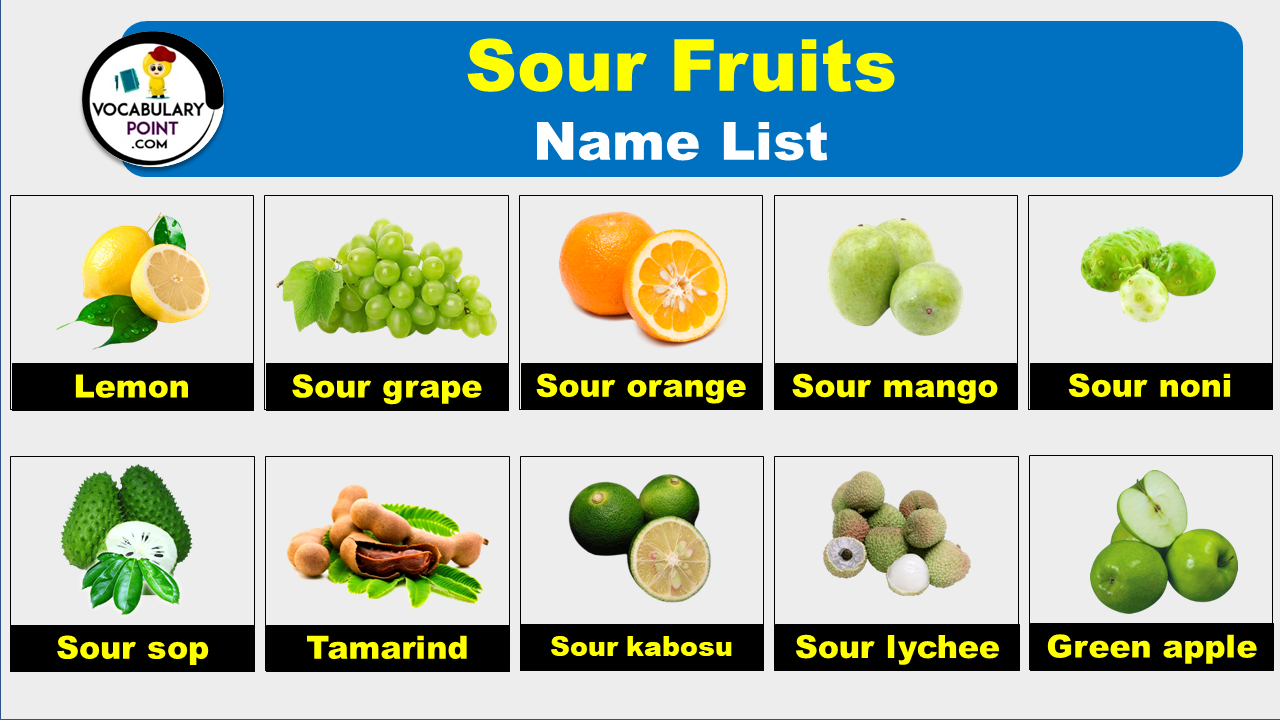When it comes to fruits, we often think of sweetness and juiciness, the perfect remedy for a hot summer day or a refreshing snack. But what about those fruits that make our taste buds pucker up and send shivers down our spine? Yes, we’re talking about sour fruits. These tangy delights have their own unique charm, providing a burst of acidity that can both tantalize and challenge our palates.
Sour Fruits Name List
Sour Mountain Ash
A fruit-bearing tree with sour, red berries. Often used in jams, jellies, and wine.
Sour Custard Apple
A variant of the custard apple with a tangier taste. Rich in vitamins, eaten fresh or used in desserts.
Sour Kumquat
Small, oval citrus fruit with a sweet edible peel and sour flesh. Eaten whole or used in preserves.
Sour Quince
A hard, sour fruit when raw, becomes sweet and aromatic when cooked. Used in jellies and pies.
Sour Mayapple
A fruit with a lemony tartness, edible only when fully ripe. Used traditionally in jams and jellies.
Sour Sea Buckthorn
Small, orange berries with a tart taste, high in vitamins and antioxidants. Used in juices and oils.
Sour Kakadu Plum
An Australian fruit known for its high vitamin C content. Tart flavor, used in sauces and health products.
Sour Bael Fruit
A hard-shelled fruit with a sour to sweet taste. Used in drinks and traditional medicine.
Gooseberry
Small, tart berries used in cooking and baking. Rich in vitamin C and dietary fiber.
Sour Cranberry Hibiscus
A plant with cranberry-flavored leaves and flowers, used in salads and teas.
Sour Nectarine
A variety of nectarine with a sharper, tangy taste. Eaten fresh or used in culinary dishes.
Sour Açaí Berry
A tart version of the açaí berry, known for its antioxidant properties. Used in bowls and juices.
Green Apple
A variety of apple with a crisp texture and tart flavor. Popular in baking and salads.
Sour Elephant Apple
A large, sour fruit used in Indian cuisine and traditional medicine. Has astringent properties.
Sour Grumichama
A Brazilian fruit with a cherry-like appearance and tart flavor. Eaten fresh or made into jams.
Sour Riberies
Refers to a tart variant of riberry, small red fruits used in sauces and condiments.
Sour Huckleberry
Small, tart berries found in North America. Used in pies, jams, and traditional dishes.
Sour Persimmon
Unripe persimmons with a puckering, tart taste. Sweetens upon ripening or after a frost.
Sour Wild Lime
A citrus fruit with a highly acidic, sour flavor. Used in culinary dishes for its zest and juice.
Sour Lychee
A tart version of the lychee, possibly unripe or a specific variety. Used in flavored dishes and drinks.
Sour Miracle Berry
Refers to the unripe or less common tart variant of the miracle berry, which can alter taste perceptions.
Sour Chayote
A variety of chayote with a more pronounced tartness. Used in salads and cooked dishes.
Sour Indian Blackberry
Also known as Jamun, tart when unripe, used in Ayurvedic medicine and as a flavor in sweets and drinks.
Sour Bitter Orange
A citrus fruit with a very sour taste, often used in marmalades and as a flavoring agent.
Sour Cempedak
A relative of jackfruit with a tart taste in its unripe form. Used in Southeast Asian cuisines.
Sour Desert Raisin
Also known as bush tomato, has a tangy flavor. Used in Australian indigenous foods and seasonings.
Sour Pomegranate
Refers to less sweet, more acidic varieties of pomegranate. Used in juices and cooking for tartness.
Sour Loganberry
A hybrid berry with a sharper taste than its raspberry and blackberry parents. Used in jams and desserts.
Sour Wattleseed
Seeds from Australian Acacia species with a bitter taste, used in indigenous cuisine and modern gastronomy.
Sour Papaya
Unripe papaya with a tart flavor, often used in salads like green papaya salad.
Sour Yuzu
A citrus fruit with a highly acidic, tart flavor. Valued for its aromatic zest and juice in Japanese cuisine.
Sour Peach
A peach variety or state of ripeness with a more acidic, tangy flavor. Used in culinary preparations.
Sour Chilean Guava
A small berry with a tart taste, native to Chile. Used in jams, jellies, and fresh.
Sour Miracle Fruit
A hypothetical sour variant of the miracle fruit, known for making sour foods taste sweet.
Sour Jabuticaba
The tart version of Jabuticaba, a Brazilian grape-like fruit. Used in beverages and jellies.
Sour Kabosu
A Japanese citrus fruit with a sour, tangy flavor. Used as a vinegar substitute and in sauces.
Sour Pineapple
Less ripe or certain varieties of pineapple with a sharper, tangier taste. Used in cooking and cocktails.
Starfruit
Also known as carambola, a fruit with a sweet and tart flavor, star-shaped when sliced. Used in salads and drinks.
Sour Indian Gooseberry
Also known as Amla, a berry with a very tart, sour flavor. Used in Ayurvedic medicine and culinary dishes.
Sour Wild Orange
A term that could refer to various citrus fruits with a sour taste, used in cooking and beverages.
Sour Guava
A less ripe or specific variety of guava with a more acidic taste. Used in juices and culinary dishes.
Sour Blackberry
Early or certain varieties of blackberries that have a tart, sour flavor. Used in baking and preserves.
Sour Jackfruit
Unripe jackfruit with a sour taste, used in savory dishes for its meat-like texture.
Sour Fig
Unripe or certain varieties of figs that present a tangy flavor. Used in cooking and preserves.
Sour Ground Cherry
A variety of ground cherry with a tart flavor, encased in a papery husk. Used in jams and as a fresh snack.
Sour Kiwi
Less ripe or specific varieties of kiwi with a sharper tartness. Used in salads and smoothies.
Cranberry
Small, tart, red berries often used in sauces, juices, and dried snacks. Known for urinary tract health benefits.
Sour Sapodilla
An unripe version of sapodilla, a tropical fruit with a grainy texture and sweet, pear-like taste when mature.
Sour Crowberry
Small, black berries with a tart taste, found in cold climates. Used in traditional indigenous cuisines.
Sour Apricot
Varieties or states of apricot ripeness that are more acidic than sweet. Used in culinary dishes and preserves.
Sour Lingonberry
Small, red berries with a tart taste, similar to cranberries. Used in jams, preserves, and Scandinavian cuisine.
Sour Currant
Refers to tart varieties of currants, both black and red, used in cooking, baking, and making jams.
Sour Muntries
Also known as emu apples, small Australian berries with a tangy flavor. Used fresh or in preserves.
Sour Desert Quince
A hypothetical or less common variant of quince that is notably tart. Used cooked in sweet and savory dishes.
Sour Emblic
Another name for Indian gooseberry or Amla, noted for its sour, astringent taste and nutritional value.
Sour Elderberry
Refers to the tart, raw state of elderberries, which are commonly used in syrups and wines after cooking.
Sour Mulberry
Early harvest or specific tart varieties of mulberries. Used in jams, pies, and culinary dishes.
Sour Feijoa
A fruit with a unique tart and sweet flavor, resembling pineapple and guava. Used in desserts and beverages.
Sour Calamondin
A small, sour citrus fruit, often used as a lemon or lime substitute in cooking and beverages.
Tamarind
A pod-like fruit used for its sour-sweet flavor, often in Asian and Latin American cuisines.
Sour Plum
Early harvest or specific varieties of plums with a more pronounced tartness. Used in culinary preparations.
Sour Strawberry
Less ripe or specific tart varieties of strawberries. Used in culinary dishes where sharpness is desired.
Sour Soursop
A less common, tart variant of soursop, known for its creamy texture and potent flavor. Used in beverages and desserts.
Sour Mango
Unripe mangoes with a tangy, tart flavor. Used in salads, chutneys, and savory dishes.
Sour Sloe
The fruit of the blackthorn bush, very tart and astringent. Used in making sloe gin and preserves.
Sour Sop
Another term for soursop, indicating a less sweet, more acidic variety. Used in tropical juices and smoothies.
Sour Medlar
A fruit that is eaten bletted (overripened) when it turns soft and tangy. Used in jellies and desserts.
Sour Raspberry
Early harvest or specific tart varieties of raspberries. Used in desserts, jams, and as a fresh topping.
Sour Grapefruit
A citrus fruit known for its bitter and sour taste. Used in breakfasts, juices, and culinary dishes.
Sour Brazilian Guava
A variant of guava from Brazil with a sharper, more acidic flavor. Used in juices and desserts.
Sour Noni
A tropical fruit with a strong odor and sour taste, often used in dietary supplements for its health benefits.
Sour Rowanberry
The tart, red berries of the rowan tree. Traditionally used in jams, jellies, and liqueurs after sweetening.
Sour Star Gooseberry
A tropical fruit with a tart taste, used in pickles, jams, and traditional medicine.
Sour Cherry
A tart variety of cherry, used in cooking, baking, and making liqueurs and preserves.
Sour Jerusalem Thorn
A plant with edible, tart pods. Not widely known, possibly used in traditional or regional cuisines.
Sour Desert Lime
Australian native citrus with a strong, sour flavor. Used in marmalades, sauces, and beverages.
Sour Caviar Lime
Also known as finger lime, contains tart, caviar-like pearls inside. Used as a garnish and in culinary dishes.
Sour Orange
A citrus fruit with a very sour taste, often used in marmalades and as a flavoring agent.
Sour Clove Currant
A fruit with a tart flavor, reminiscent of cloves. Used in cooking and making jams.
Sour Barberry
Small, tart berries used in Persian cuisine, known for its sour flavor. Rich in vitamin C.
Sour Blueberry
Early harvest or specific tart varieties of blueberries. Used in baking, jams, and as fresh toppings.
Sour Watermelon
Less common, referring to watermelons with a less sweet, more tangy flavor profile.
Sour Japanese Raisin Tree
Fruit from the Hovenia dulcis tree, known for its sweet and slightly sour taste. Used in traditional East Asian medicine.
Sour Wampee
A citrus-like fruit with a sweet-tart flavor, used in Asian cuisine and traditional medicine.
Sour Passion Fruit
Known for its aromatic and tangy-sweet flesh, used in juices, desserts, and culinary dishes.
Sour Grape
Early harvest or specific varieties of grapes with a more pronounced tartness. Used in wines and culinary dishes.
Lime
A citrus fruit, typically green, small, and sour in taste. Used for its juice and zest in cooking and beverages.
Sour Marula
A fruit from the marula tree, tart when unripe. Used in the production of Amarula liqueur and eaten fresh.
Sour Finger Lime
A citrus fruit known for its tangy caviar-like pearls. Used as a garnish and in culinary creations.
Sour Emu Apple
A term not widely recognized, possibly referring to a specific sour variety of a native Australian fruit.
Lemon
A bright yellow citrus fruit with a strong sour taste. Used for its juice and zest in cooking and beverages.
Sour Prickly Pear
The tart version of prickly pear, a fruit from the cactus plant. Used in Mexican cuisine and beverages.
Sour Crabapple
Small, tart apples, often too sour to eat raw but excellent for making jellies and preserves.
Explore More Fruits Names:
Diet Fruits | Hard Fruits | Sweet Fruits
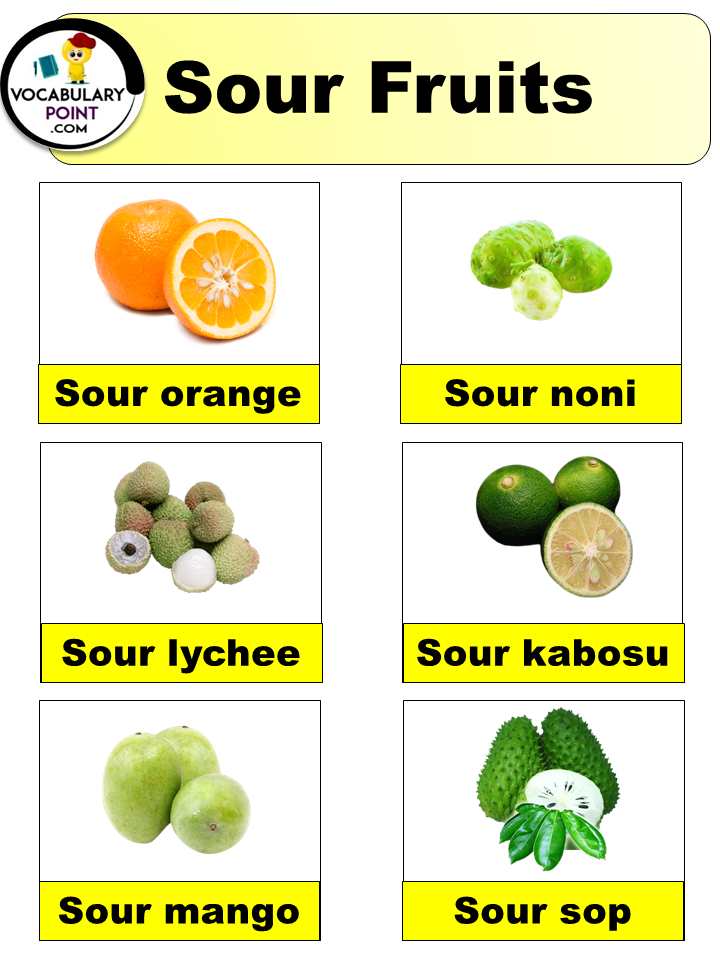
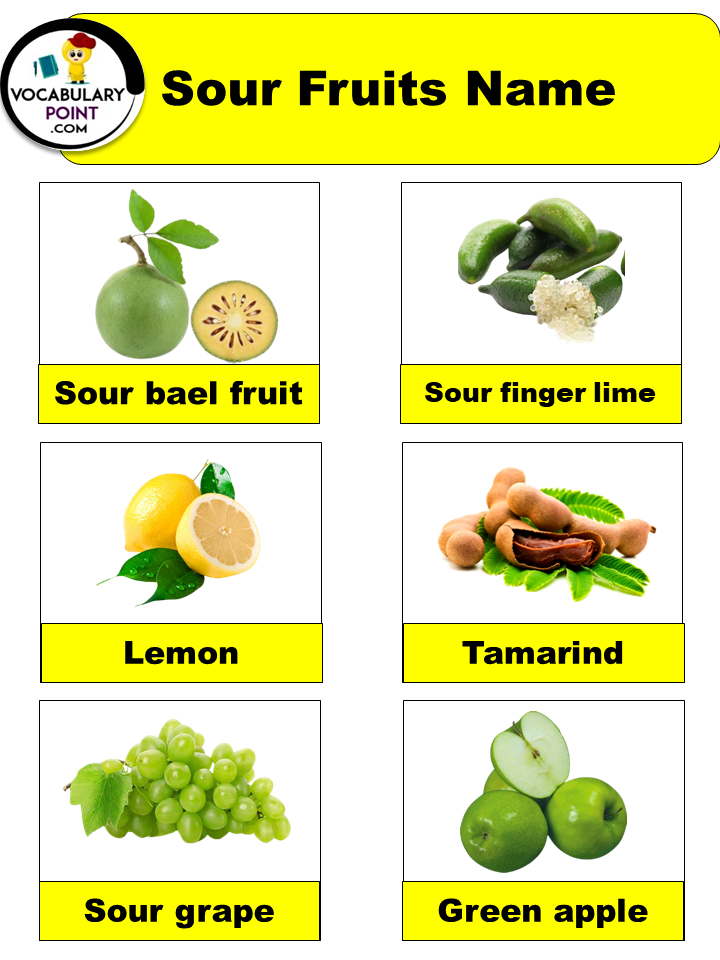
Sour Fruits Names with Pictures
Sour Bael Fruit
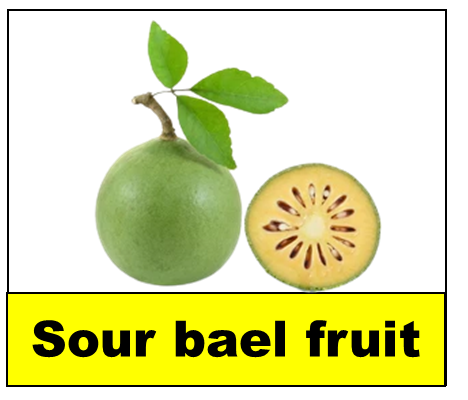
- Digestive Aid:
Sour bael fruit is known for its digestive benefits. It contains compounds that can soothe the digestive tract, reduce inflammation, and promote regular bowel movements, making it beneficial for individuals with digestive discomfort.
- Rich in Vitamins:
Sour bael fruit is a good source of essential vitamins, including vitamin C, which supports the immune system, and vitamin A, which is important for eye health and overall well-being.
- Antioxidant Properties:
Sour bael fruit contains antioxidants that help protect cells from oxidative damage. These antioxidants contribute to overall health and may reduce the risk of chronic diseases.
Sour finger lime
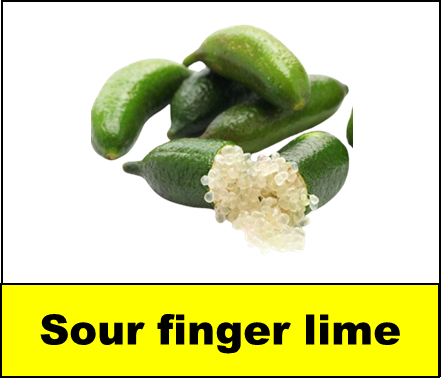
- Antioxidant-Rich:
Sour finger limes are packed with antioxidants, including vitamin C and flavonoids, which help combat free radicals in the body, reducing oxidative stress and supporting overall health.
- Digestive Health:
The dietary fiber in sour finger limes promotes healthy digestion, prevents constipation, and contributes to a well-functioning gastrointestinal system.
- Immune Support:
Sour finger limes’ vitamin C content is beneficial for the immune system, helping the body defend against infections and illnesses.
Lemon

- Rich in Vitamin C:
Lemons are a plentiful source of vitamin C, a crucial nutrient that supports the immune system, promotes collagen production for healthy skin, and acts as an antioxidant to protect cells from damage.
- Alkalizing Properties:
Despite being acidic in nature, lemons have an alkalizing effect on the body when metabolized, helping to balance pH levels and maintain overall health.
- Digestive Aid:
Lemon juice can aid in digestion by stimulating the production of digestive enzymes and promoting regular bowel movements. It can also help relieve symptoms of indigestion and bloating.
Tamarind
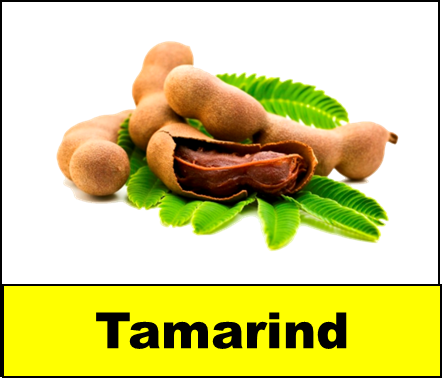
- Antioxidant-Rich:
Tamarind is packed with antioxidants, such as flavonoids and polyphenols, which help combat free radicals in the body, reducing oxidative stress and supporting overall health.
- Digestive Aid:
Tamarind contains dietary fiber and natural laxatives, making it effective in promoting healthy digestion, preventing constipation, and alleviating digestive discomfort.
- Heart Health:
Tamarind may contribute to heart health by helping to lower cholesterol levels and reduce blood pressure, reducing the risk of cardiovascular diseases.
Sour grape
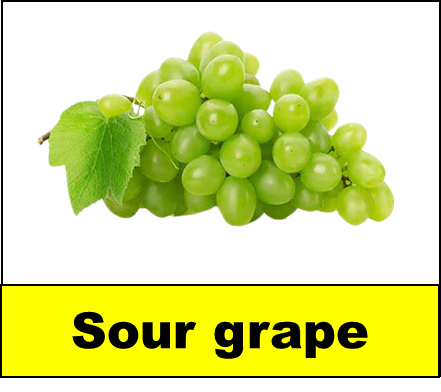
- Antioxidant Properties:
Sour grapes are rich in antioxidants, such as resveratrol, which help protect cells from oxidative damage and support overall health.
- Anti-Inflammatory:
Compounds in sour grapes may have anti-inflammatory effects, potentially reducing inflammation in the body and its associated health risks.
- Heart Health:
Some research suggests that resveratrol in sour grapes may benefit heart health by promoting healthy blood flow, reducing cholesterol levels, and supporting cardiovascular well-being.
Green apple
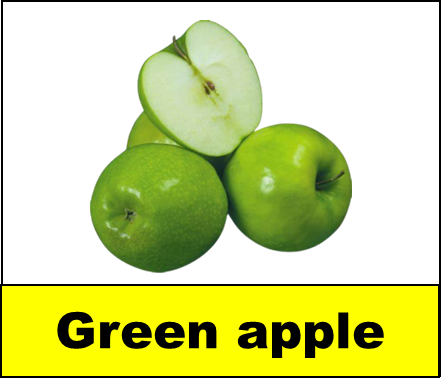
- Low in Calories:
Green apples are low in calories, making them a healthy and satisfying snack choice for those looking to manage their calorie intake.
- Rich in Fiber:
Green apples are a good source of dietary fiber, which supports digestion, promotes regular bowel movements, and contributes to a feeling of fullness.
- Dental Health:
Chewing green apples can help stimulate saliva production, which, in turn, can reduce the risk of tooth decay and gum disease by maintaining oral hygiene.
Sour orange
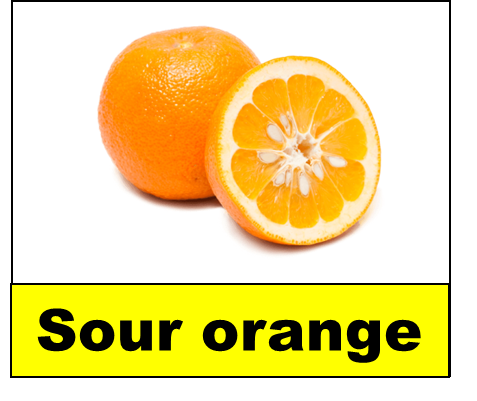
- Rich in Vitamin C:
Sour oranges are a good source of vitamin C, which is essential for a strong immune system, healthy skin, and wound healing.
- Digestive Aid:
Sour oranges contain compounds that can aid digestion, relieve indigestion, and promote a healthy gastrointestinal system.
- Aromatic Properties:
The essential oil extracted from sour orange peels is used in aromatherapy and perfumery for its pleasant and uplifting scent, which can promote relaxation and reduce stress.
Sour noni
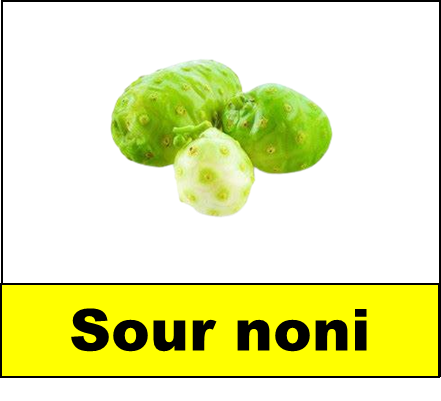
- Immune Support:
Sour noni is known for its immune-boosting properties, thanks to its rich vitamin C content. It can help strengthen the immune system and enhance the body’s defense against infections.
- Digestive Aid:
Sour noni contains dietary fiber, which aids in digestion, promotes regular bowel movements, and contributes to a healthy gastrointestinal system.
- Antioxidant Power:
Sour noni is packed with antioxidants that help protect cells from oxidative damage. These antioxidants may reduce the risk of chronic diseases and promote overall well-being.
Sour lychee
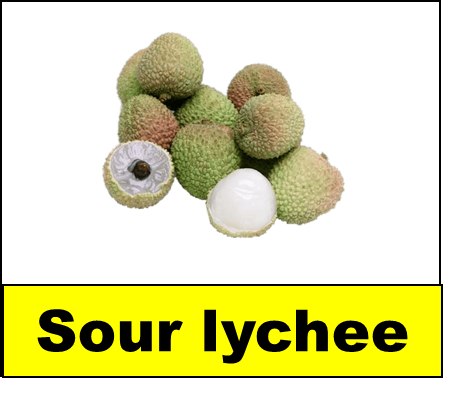
- Antioxidant Properties:
Sour lychee is rich in antioxidants, such as vitamin C, which help combat free radicals, reducing oxidative stress and supporting overall health.
- Digestive Aid:
Sour lychee contains dietary fiber, which promotes healthy digestion, prevents constipation, and supports a well-functioning gastrointestinal system.
- Immune Boost:
The vitamin C in sour lychee can help boost the immune system, making the body more resilient against infections and illnesses.
Sour kabosu
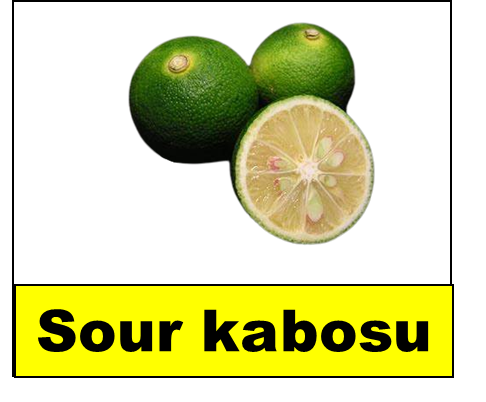
- Rich in Antioxidants:
Sour kabosu is loaded with antioxidants, such as vitamin C and flavonoids, which help protect cells from oxidative damage, reduce inflammation, and support overall well-being.
- Digestive Support:
Sour kabosu contains dietary fiber, which promotes healthy digestion, aids in regular bowel movements, and contributes to a well-functioning gastrointestinal system.
- Heart Health:
Some research suggests that the antioxidants in sour kabosu may have cardiovascular benefits by promoting healthy blood flow, reducing cholesterol levels, and supporting heart health.
Sour mango
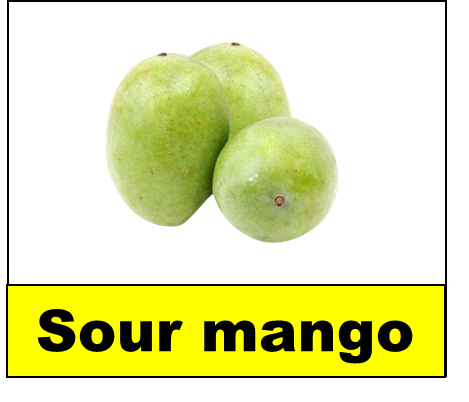
- Rich in Vitamin C:
Sour mangoes are a good source of vitamin C, an essential nutrient that supports the immune system, promotes healthy skin, and acts as an antioxidant to protect cells from damage.
- Digestive Aid:
Sour mangoes contain enzymes like amylases that aid in digestion by breaking down carbohydrates. They also have dietary fiber, which promotes regular bowel movements and supports a healthy gastrointestinal system.
- Alkalizing Properties:
Despite their sour taste, mangoes have an alkalizing effect on the body when metabolized, helping to balance pH levels and maintain overall health.
Sour sop
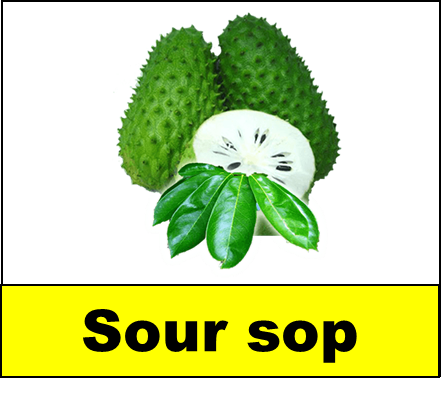
- Rich in Antioxidants:
Soursop is packed with antioxidants, such as vitamin C and acetogenins, which help protect cells from oxidative damage, reduce inflammation, and support overall well-being.
- Digestive Health:
Soursop contains dietary fiber, which promotes healthy digestion, prevents constipation, and supports a well-functioning gastrointestinal system.
- Immune Support:
The vitamin C content in soursop helps boost the immune system, making the body more resilient against infections and illnesses.
